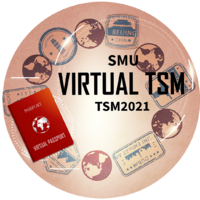2021T2 VirtualTSM/Participant Information/Victoria Phua
| HOME | | COURSE | | ITINERARY | | ROLE | | TEAM | | ORGANIZATION | | REFLECTION |
Contents
About Victoria Phua
SMU email: rqphua.2018@law.smu.edu.sg
Linkedin: LinkedIn
Academic Year: 18
Degree: Bachelor of Law (LLB)
Why Virtual TSM?
* What motivates you to join TSM?
I am interested in learning how to start and sustain a new business that is technology-based.
The Covid situation has really opened my eyes to the importance of technologies to power a business.
The pandemic has accelerated the digitalization of governments, businesses and homes,
- forcing the state to engage its citizens online (yes … even GE rallies),
- compelling buyers and sellers to transact online (yay … more atas restaurants have signed up on food delivery apps), and
- driving families and friends to hustle online (hmm … virtual karaoke sessions across borders are now available).
Suddenly the bar has been raised in 2020—more services and activities are being digitized everyday—and businesses have to digitize or die.
Through TSM, I hope to find out why some companies can succeed in growing their business in the face of adversity while others fail.
* Where would you like to visit virtually?
- According to the annual Startup Genome’s Global Startup Ecosystem 2020 report, Silicon Valley maintains its top rank as a startup ecosystem where early-stage startups have the best chance of success. Meanwhile, Asian cities such as Beijing and Shanghai have risen fast into the top 10, while Tokyo and Seoul have made it to the top 20 cities, that have been traditionally dominated by US and European cities.
- As homes to many successful and innovative companies, I would like to visit Japan, South Korea or China to understand how the public policymakers have worked with their home-grown corporations, universities and public research institutes to provide a very conducive environment to foster technology-based start-ups that address pressing societal needs such as food security and ageing population.
Starting a business
* What types of business interest you?
- Singapore has a long-term plan to meet the country’s food security target of producing 30% of its own food by 2030, with the possibility of introducing plant-based protein and lab-grown meat into our future food.
- I hope to visit start-ups that apply such food technologies (e.g. soybean-based meat maker DAIZ backed by Mitsubishi corporate venture arm, cultured meat maker Integriculture backed by conglomerate NH Foods Group in Japan).
- A visit to these start-ups and hopefully their corporate investors will help us understand how they plan to address the challenge of changing the natural-meat dietary habits that are deeply entrenched in many cultures.
- Of course, being a foodie, I also hope to ensure our countrymen’s future food diet is still palatable, delectable and scrumptious.
* What plan do you have in starting a business?
- Research has shown that the critical success factors of a new business include identifying a viable business model, forming a heterogeneous team with complementary skill set/experience, and having access to R&D, mentors, funding and infrastructural/facilities.
- I plan to form a team with like-minded individuals who are interested in solving pressing societal problems through technology and entrepreneurship, before joining an accelerator programme.
- In Singapore, there are several institutions funded by the Singapore government that offer accelerator programmes to nurture startups in specific domains. In the food technology domain, there are Big Idea Ventures with New Protein Fund of over US$50m and agri-food tech accelerator GROW', that I plan to apply to for the 2021 intake.
- During the course of their programme, the accelerator will provide start-up teams access to mentors, investors, industry experts and funding in related areas.
- Apart from these specialized accelerators, I will also try to enrol in SMU IIE’s Lean Launchpad Programme or BIG Incubation Programme to take the opportunity to validate and refine our business model using the lean startup approach.
- The TSM programme is therefore a wonderful opportunity for us to not only find like-minded individuals, but also learn from startups and their stakeholders the challenges involved, and the responses taken to address the challenges.
Past Experiences (optional)
Internships
Intern, RHTLaw Asia LLP
- Supported work on corporate, tax and restructuring matters
Intern, Drew & Napier LLC
- Prepared draft opinions for clients on the viability of their tax claims against the Inland Revenue Authority of Singapore
International Arbitration in Asia and Singapore, Intern, Providence Law Asia
- Prepared draft opinions on possible causes of actions for sealing and setting aside arbitral awards
Student Researcher, NUS Enterprise
- Conducted research for the National University of Singapore Overseas College (NOC) alumni
Intern, Singapore Academy of Law Junior College Law Programme
- Attached to a legal practitioner in the Supreme Court and attended her court hearings
Commercial Litigation Intern, Rajah & Tann LLP
- Prepared draft arguments to present in court on how to admit evidence such as video recording evidence
3D Printing Technology, Student Researcher, Neo Institute
- Conducted a year-long market research on viability of 3D printing technologies in local schools
Competitions
- Gold Award winner, National “My School My Green School” video contest organized by Building and Construction Academy, Republic Polytechnic and CPG Consultants under the Green Schools initiative
- Gold medal - team, national Robocup Singapore - RoboDance Competition
- National Champion - team, Singapore Team Global Issues Problem Solving Competition organized by GSK-EDB
What keeps you ticking?
- Learning new skills and seeing happy customers
